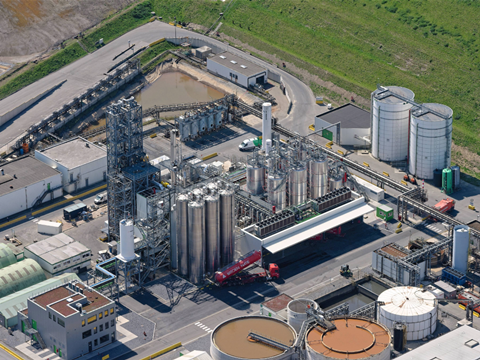
Following a total investment of €105 million, Indaver has announced that its Plastics2Chemicals installation in Antwerp is producing chemically recycled raw materials for ‘virgin quality’ packaging applications, with an anticipated annual capacity of 26kT.
Plastics2Chemicals utilizes Indaver’s thermal depolymerization technology to break polymers down into monomers. Further purification processes, including distillation, are believed to prepare these building blocks for ‘virgin-quality’ and contact-sensitive applications, including recycling used yoghurt pots into new yoghurt pots.
This is hoped to avoid the creation of new fossil-based plastics, keep plastic materials in the recycling loop, and lower CO2 emissions. Green electricity is reportedly used to power the recycling process, sources from a local energy cluster with solar and wind energy.
Recycling waste on European soil is also hoped to lessen the continent’s dependence on raw material imports and help pursue the EU’s climate goals.
“With Plastics2Chemicals, we have succeeded in converting waste into valuable raw materials,” says Indaver CEO Karl Huts. “We achieved this result by combining innovation, vision, entrepreneurship, collaboration, and craftsmanship.
“I am particularly proud of our team: their expertise and determination have made this sustainable solution possible. This shows that we can really make a difference in the circular economy.”
As well as chemical recycling, the Plastics2Chemicals approach involves sorting packaging materials, pre-treating them to form pellets, ‘sustainable’ residue processing, and logistics services. Indaver aims to manage and optimize a supplier or customer’s entire supply chain without requiring extra investment or changes to existing processes.
The company has signed long-term contracts with companies like Fost Plus and Citeo. It also lists INEOS Styrolution, Trinseo, Borealis, TotalEnergies, and Neste among its customers.
After collaborating with knowledge institutions throughout the research and development process, Indaver plans to keep investing in its R&D centre to optimize the recycling process, as well as prepare for upcoming applications and scaling.
“After years of intensive research, testing, and collaboration with universities and partners, it is a special moment to now be able to deliver recycled products to our customers,” continues Erik Moerman, director of Sales & Development for Plastics2Chemicals. “We are proud of the innovative process we have developed and optimized, and which now proves, on an industrial scale, that high-quality recycling of plastics is possible.”
An official opening ceremony will be held for the Plastics2Chemicals installation, attended by Flemish Minister of Environment and Agriculture Jo Brouns.
“This installation demonstrates how Flanders is contributing to European ambitions and the transition to a circular economy through reliable innovation,” adds Brouns. “By recovering valuable materials from waste, we strengthen our strategic autonomy and build a sustainable future for our industry and society. It also shows that there is room in Flanders and Europe for state-of-the-art investments in chemical recycling.”
Indaver and Katoen Natie are currently preparing to roll out dedicated polyolefin and polystyrene recycling plants in Europe, using the current Antwerp instillation as a scalable model.
Back in July, Veolia announced its own investment of £70 million (€81,227,650) into a closed-loop, tray-to-tray PET recycling facility. It expects to shred, wash, and flake PET trays and bottles from both domestic and industrial waste streams, processing 80,000 tonnes of mixed plastics annually to generate new, food-grade packaging.
In another approach, Plastic Energy reports that it has converted hard-to-recycle post-consumer plastic waste into pyrolysis oil at its Geleen facility. The oil is set to be used to produce food-contact packaging, medical plastics, and more.
If you liked this story, you might also enjoy:
The ultimate guide to the Packaging and Packaging Waste Regulation in 2025
How are the top brands progressing on packaging sustainability?
Everything you need to know about global packaging sustainability regulation in 2025
The key to increasing the use of reusable packaging in supermarkets














No comments yet